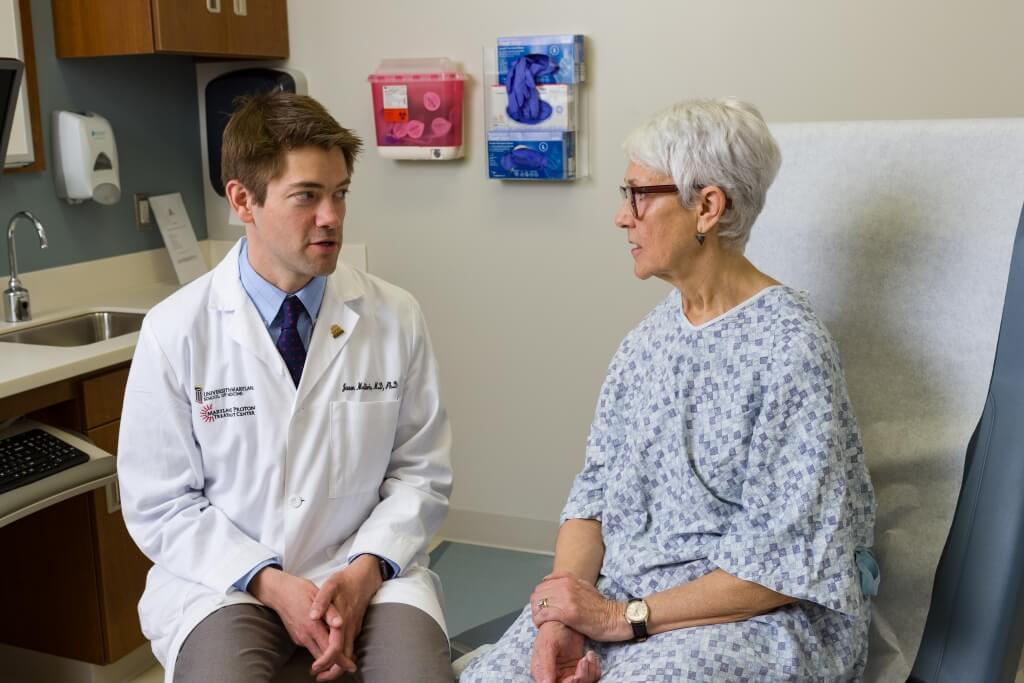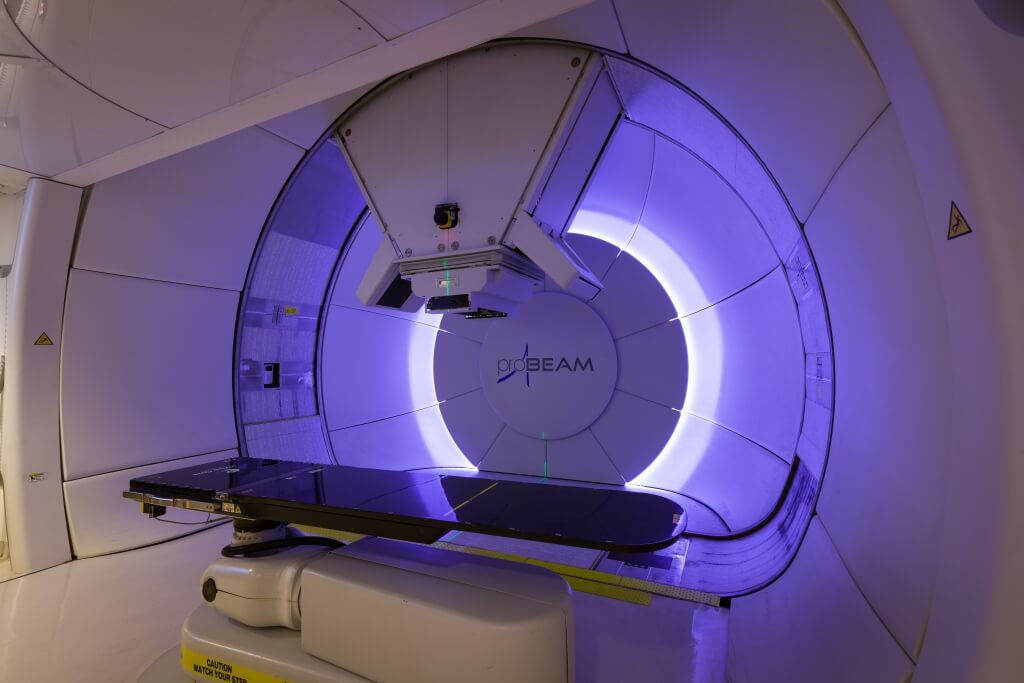2,000+ Patients Treated Since 2016
The Maryland Proton Treatment Center offers the most advanced form on proton therapy in the world – called pencil beam scanning. MPTC is one of only a few centers in the US to have this in all treatment rooms.
Since proton therapy delivers an increased dose that stops specifically at the tumor site, it protects much of the surrounding, normal tissue. It’s painless, non-invasive and well tolerated which often times leads to fewer side effects now and in the future.
Is Proton Therapy Right For Me?
Proton therapy is ideal for localized, solid tumors near critical organs in the body. It can treat a wide variety of cancers including but not limited to:
| Base of the skull | Liver |
| Brain | Lung |
| Breast | Lymphoma |
| Esophagus | Pediatric cancers |
| Eyes | Prostate |
| Gastrointestinal tract | Sarcoma |
| Gynecologic | Spinal cord |
| Head and neck |

Why Choose MPTC?
Most-Advanced Technology

Pencil-beam scanning technology paints the radiation onto the tumor like a 3-D printer for pinpoint accuracy. MPTC is one of only a few proton therapy facilities in the country to feature this is every treatment room.
Our Expert Team

MPTC physicians provide a unique level of proton therapy experience and expertise, with an average of 20 years of clinical experience and a combined 40+ years of proton therapy experience.
Better Access to Care

MPTC has established a cost-neutral rate for treatment between protons and photons. Because of this affordable cost structure, MPTC currently has an insurance approval rate of 85%.
Frequently Asked Questions
Proton Therapy Treatment FAQ’s
The practical difference between the two therapies is the distribution and absorption of the radiation. Conventional radiation passes entirely through the patient’s body, starting off strong and getting weaker and weaker as it passes through. Consequently, the radiation from conventional therapy is absorbed by the surrounding organs in the process, which causes varying side effects dependent on the area of the body where the tumor lies.
In contrast, proton therapy stops at the site of the tumor, so it terminates cancerous cells but spares the normal, healthy surrounding tissue. Due to the accuracy of the proton beam, side effects are may be lower, providing a higher quality of life for a patient throughout their treatment and limiting long-term side effects in the future.
Proton therapy is the ideal treatment for pediatric patients, since the targeted dosage of radiation avoids much of the nearby surrounding tissue. This limits the risk of future health conditions that can arise as a result of young patients being treated with photon radiation, which impacts more of the surrounding areas.
Not all cancers or clinical conditions require proton therapy. Our experts have experience in all radiation therapy modalities such as photon (x-ray) therapy, electrons and brachytherapy and will recommend the type of radiation or combination of radiation that is best for you.
Yes, all patients will be treated by the same physician for the full duration of their treatment.
Physicians from the Maryland Proton Treatment Center have participated in many research studies demonstrating the efficacy of proton therapy. View of list of them here.
It uses a 90-ton cyclotron to accelerate protons to two thirds the speed of light, sending them down a beamline the length of football field and into one of five treatment rooms.
Four of five of our treatment rooms feature a rotational gantry. This hidden 3-story tall machine helps move the treatment nozzle up to 360 degrees into the precise position to deliver your treatment.
The beam is delivered without sound or pain in a matter of minutes with millimeter precision.
Because proton therapy offers precise tumor targeting, physicians can limit the amount of radiation that healthy tissues near the tumor receive. This means that physicians can treat tumors more aggressively, with higher doses of radiation, without higher risk.
If your tumor has grown back (recurrence), aggressive treatment is often the best course of action. Proton therapy puts radiation back on the table as a treatment option for recurrent tumors.
One of the primary indications for proton beam therapy is in patients who have had previous radiation therapy.
From the mid 1950’s on, proton treatment began for a limited number of cancers, with computing and treatment delivery technology advancing rapidly over the next 30 years.
By the 1980’s, these advancements made proton therapy a viable option for treating localized solid tumors in many areas of the body and proton treatment facilities began to open. Up until the last ~10 years however, proton therapy remained a scarce resource in our country with only certain types of tumors being treated. Over the last 10 years, more centers have opened and as a result a wider variety of cancers are now treated.
In 2016, the Maryland Proton Treatment Center opened as the first center in the region to offer proton therapy with the most advanced form of proton therapy in the world, called pencil beam scanning. We have treated over 2000 patients and counting with the most experienced team in the region.
Proton Therapy Cost FAQ’s
We also work with insurance providers from around the country.
If you have questions regarding billing, please email billing@mptcproton.com and a team member will respond within two business days.
Maryland Proton Treatment Center FAQ’s
The Maryland Proton Treatment Center has intensity-modulated proton therapy (IMPT, also known as pencil-beam) available in each of our five state-of-the-art treatment rooms. This form of therapy provides the most accurate form of radiation therapy available. A more precise beam can also allow for higher doses of radiation which in some cancers can increase the overall efficacy of the treatment without increasing side effects for the patient.
Continuing the tradition of patient-centered care University of Maryland Medical Center has been practicing since its inception, we provide a comfortable and convenient treatment experience for our patients. Our concierge team will welcome and assist the patient from beginning to end of the treatment process.
Dr. Regine has conducted research which defined new standards of care for patients with pancreatic cancer, brain metastases and malignant spinal cord compression. He also co-edited “Principles and Practices of Stereotactic Radiosurgery”, the first comprehensive textbook of its kind. His clinical and research expertise as well as his personable and knowledgeable leadership are indispensable to MPTC.
Dr. Miller, a nationally recognized radiation oncologist who specializes in thoracic, GI cancers and lymphomas, joined MPTC following more than 25 years’ experience at the Mayo Clinic, where he served as Vice Chair of Radiation Oncology for proton research. He led extensive clinical research on the use of compounds to mitigate the risk of normal tissue injury in patients during radiation therapy.
Maryland Proton Treatment Center FAQ’s
If you reside outside of the Baltimore area and will be commuting into the city for treatment, our concierge team will work with you to come up with a transportation plan to ensure you’ll have reliable transit to and from each treatment, which may include transportation provided by MPTC.
MPTC can also provide guidance on lodging at the American Cancer Society’s Hope Lodge or the Ronald McDonald House in Baltimore.
“The Treatment Is Amazing”
Former breast cancer patient Cindy Tinley talks about her MPTC experience.
40+ Combined Years of Experience
The Maryland Proton Treatment Center (MPTC) is led by renowned radiation oncologists from the University of Maryland School of Medicine. Our physicians are involved in cutting-edge research and clinical trials, and are leading experts who have been formally trained in proton therapy to treat patients with a wide variety of cancers.
MPTC physicians provide a unique level of proton therapy experience and expertise, with an average of 20 years of clinical experience and a combined 40+ years of proton therapy experience.
Read on to learn more about MPTC’s radiation oncologists, their expertise, and the cancer sites they treat with proton therapy.

Professor and Isadore & Fannie Schneider Foxman Chair, Department of Radiation Oncology, University of Maryland School of Medicine
Dr. Regine is a leader in the field of radiation oncology and a recognized expert in the areas of GI and CNS malignancies. He has served as a principal investigator for multiple NCI-sponsored clinical trials. His research has defined new standards of care for patients. He is co-inventor of the “GammaPod,” the first treatment system dedicated to the stereotactic radiation of early stage breast cancer and is co-editor of “Principles and Practices of Stereotactic Radiosurgery,” the first comprehensive textbook of its kind.
- Special Interests: Base of skull/paranasal sinuses, Central nervous system (brain/spine), Esophagus, GI (anus/rectum/stomach/colon/liver/pancreas), Head and neck (non-paranasal sinuses), sarcoma
- Medical Degree: State University of New York Health and Science Center
- Residency: Thomas Jefferson University Hospital
- Physician Fellowships: Thomas Jefferson University Hospital and University of Florida, Radiation Oncology
- Certification: Radiation Oncology
To learn more about Dr. Regine, please watch the video below:

Dr. Miller, a nationally recognized radiation oncologist, joined MPTC in April 2019 following more than 25 years of practice experience at the Mayo Clinic where he was Vice Chair of Radiation Oncology for proton research in Rochester, Minnesota and Medical Director for Proton Therapy in Jacksonville, Florida.
He has conducted extensive clinical research on the use of compounds to mitigate the risk of normal tissue injury in patients undergoing radiation therapy. He is the founding Editor in Chief of ASTRO’s Advances in Radiation Oncology. He treats patients with gastrointestinal cancers.
- Special Interests: Gastrointestinal Cancers, Thoracic Cancers
- Medical Degree: University of Kentucky
- Residency: Mayo Clinic Rochester, Minnesota
To learn more about Dr. Miller, please watch the video below:
 Assistant Professor of Radiation Oncology, University of Maryland School of Medicine
Assistant Professor of Radiation Oncology, University of Maryland School of Medicine
Dr. Ferris’s primary practice locations include University of Maryland Upper Chesapeake Health, University of Maryland Medical Center, and the Maryland Proton Treatment Center. He has broad clinical interests that encompass treatment for most malignant and non-malignant tumors, and use of advanced radiation techniques.
- Medical Degree: University of Maryland School of Medicine
- Residency: Emory University
- Certification: Radiation Oncology

Dr. Kwok specializes in using proton therapy to treat pediatric patients. His clinical specialties include brain tumors, skull base tumors, and genitourinary tumors, including prostate and bladder cancers. He is an active researcher who serves as the principal investigator on several clinical trials.
- Special Interests: Lymphoma/leukemia/myeloma/bone marrow, Pediatric patients (with and without central nervous system cancers)
- Medical Degree: Albert Einstein College of Medicine
- Residency: University of Maryland Medical Center
- Certification: Radiation Oncology
 Assistant Professor of Radiation Oncology, University of Maryland School of Medicine
Assistant Professor of Radiation Oncology, University of Maryland School of Medicine
Dr. McAvoy has several years of experience in practice and treats all sites of cancer. She has a special interest in women’s health and treating breast and gynecologic cancers. Dr. McAvoy also specializes in the treatment of brain and spine tumors as well as thoracic tumors. Her research focus has been on glioblastomas, thoracic radiation, reirradiation, and normal tissue toxicity.
- Special Interests: Breast, GYN, Thoracic, and CNS
- Medical Degree: University of Minnesota Medical School
- Residency: University of Texas M.D. Anderson Cancer Center
- Certification: Radiation Oncology

Dr. Mishra is the Director of Radiation Oncology Clinical Research. He specializes in the management of patients with central nervous system, genitourinary, and breast tumors. His research focus at the University of Maryland has centered on comparative and cost-effectiveness studies on new and complex radiation therapy technologies. He has published more than fifty peer-reviewed journal articles and book chapters. He is an active member of ASTRO and the American College of Radiology. He is also a member of the Patient Centered Outcomes Research Institute (PCORI) Patient Engagement Advisory Panel.
- Special Interests: Central nervous system, genitourinary, and breast tumors
- Medical Degree: University of Cincinnati College of Medicine
- Residency: Thomas Jefferson University Hospital
- Certification: Radiation Oncology

Dr. Mohindra is a physician-scientist who treats patients with thoracic/lung and gynecologic cancers. His research includes efforts to find better ways to protect healthy tissue when using radiation therapy to destroy cancer cells.
- Special Interests: Gynecologic (vagina/cervix/endometrial), Thoracic (lung/mesothelioma/thymoma)
- Medical Degree: University of Mumbai, DR. D.Y. Patil Medical College
- Residency: Tata Memorial Center, University of Mumbai, India; University of Wisconsin
- Physician Fellowships: Princess Margaret Hospital, University of Toronto
- Physician Research Fellowships: University of Texas MD Anderson Cancer Center

Dr. Molitoris’ areas of clinical interest include genitourinary (prostate), gastrointestinal, and hemato-lymphoid malignancies. He is focused on utilizing multiple advanced treatment technologies, including proton therapy and thermal therapy, both of which are offered at MPTC.
Dr. Molitoris is an active clinician and researcher in the Department of Radiation Oncology at the University of Maryland.
 Associate Professor of Radiation Oncology, University of Maryland School of Medicine
Associate Professor of Radiation Oncology, University of Maryland School of Medicine
Dr. Nichols’s clinical research focuses on breast and gynecologic cancers, but she is experienced in treating patients with a wide variety of cancers. She has helped to pioneer new treatment options for treating breast cancer that minimize damage to healthy tissue, including GammaPod, the first treatment system dedicated to the stereotactic radiation of early stage breast cancer. For her work, she was named as one of The Baltimore Sun’s 25 Women to Watch in 2019.
At the Maryland Proton Treatment Center, Dr. Nichols will see patients from Howard County who are in need of proton therapy.
- Special Interests: Breast cancer, Gynecologic cancers
- Medical Degree: University of Maryland Medical Center
- Residency: University of Maryland School of Medicine
- Certification: Radiation Oncology
To learn more about Dr. Nichols, please watch the video below:

Director, Division of Translational Radiation Sciences
Co-Director, Maryland Proton Alliance
Dr. Vujaskovic is a renowned researcher in radiation biology. He is particularly interested in finding new ways to treat and eradicate deadly cancers through unique treatments like thermal therapy, which applies heat to tumors in an effort to improve clinical outcomes.
At MPTC, he leads the Maryland Proton Alliance – an important research consortium that advances patient-centered care and precision medicine – and specializes in treating patients with prostate cancer.
- Special Interests: Genitourinary (prostate/bladder/kidney/testicle)
- Medical Degree: University of Zagreb Medical School, Croatia
- Residency: Military Medical Academy in Belgrade, Yugoslavia
- Physician Fellowships: University of Colorado Cancer Center, Medical Oncology; Colorado State University, Radiological Health Services
- Certification: Radiation Oncology
To learn more about Dr. Vujaskovic, watch the video below:

